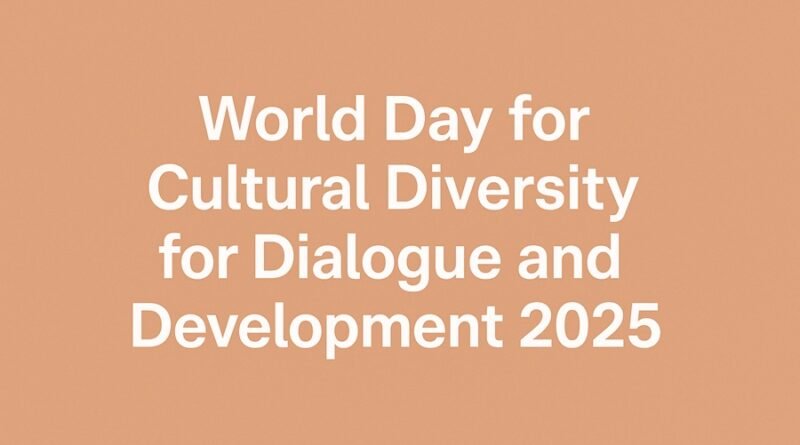World Day for Cultural Diversity for Dialogue and Development 2025: Significance, History, and Global Impact
World Day for Cultural Diversity for Dialogue and Development, observed annually on May 21, celebrates not just the richness of the world’s cultures but also the essential role of intercultural dialogue in achieving peace and sustainable development. This global observance, proclaimed by the United Nations, reminds us of the immense value cultural diversity brings to society, politics, the economy, and spiritual understanding.
In a rapidly globalizing world, where homogenization of culture poses risks to indigenous identities and traditions, this day calls for protecting, preserving, and promoting cultural diversity. The observance emphasizes that sustainable development and lasting peace are only possible when cultural diversity is integrated into national and international strategies.
Quick Facts
| Element | Details |
|---|---|
| Date | May 21 |
| First Observed | 2002 |
| Proclaimed by | United Nations General Assembly |
| UNESCO Involvement | Strongly supported through cultural programs |
| 2025 Theme (Expected) | “Harmony in Diversity: Bridging Cultures for a Sustainable Future” |
Historical Background
The World Day for Cultural Diversity for Dialogue and Development was adopted following the adoption of the Universal Declaration on Cultural Diversity by UNESCO in 2001. In the wake of global crises and cultural misunderstandings, the declaration was a powerful response emphasizing the need for mutual respect and cultural coexistence.
In December 2002, the United Nations General Assembly (UNGA) declared May 21 as the official day to promote understanding of cultural diversity and foster dialogue among civilizations. The declaration aimed at reaffirming culture as a means of achieving unity, not division.
Importance of Cultural Diversity
Cultural diversity is more than the presence of different cultural traditions. It encompasses:
- Language diversity
- Ethnic and religious differences
- Artistic expressions
- Traditional knowledge systems
- Cultural heritage and practices
The significance lies in the way societies evolve by exchanging knowledge, beliefs, values, and ideas. Diversity fosters creativity, innovation, tolerance, and resilience.
Cultural Dialogue: A Pillar of Peace
In today’s fractured world, where polarization and xenophobia often dominate discourse, cultural dialogue acts as a healing force. Here’s why it’s essential:
- Promotes tolerance and mutual respect
- Reduces prejudices and stereotypes
- Encourages collaboration and mutual learning
- Supports conflict resolution through understanding
- Enriches societies with fresh perspectives
Cultural Diversity and Sustainable Development
The 2030 Agenda for Sustainable Development recognizes the role of culture in achieving development goals. Cultural diversity contributes to:
- Quality Education (SDG 4): By incorporating indigenous knowledge and multilingual education.
- Sustainable Cities (SDG 11): Through preservation of heritage and promotion of cultural tourism.
- Decent Work and Economic Growth (SDG 8): Via creative industries and local entrepreneurship.
- Gender Equality (SDG 5): Through inclusive cultural narratives and empowerment.
Celebrations Around the World
Across continents, May 21 is marked by cultural festivals, exhibitions, interfaith dialogues, art performances, and policy dialogues. Some examples include:
- UNESCO’s cultural exchange initiatives
- Community events showcasing traditional music, dance, food, and crafts
- Intercultural conferences and seminars in universities
- Museum and heritage site open days
- Virtual dialogues and social media campaigns using hashtags like #WorldCulturalDiversityDay
Role of Education and Media
Education:
- Encouraging cross-cultural curriculum and history education.
- Promoting bilingual and mother-tongue learning.
Media:
- Responsible storytelling that highlights diversity positively.
- Avoiding stereotypes and giving voice to marginalized cultures.
India’s Role in Promoting Cultural Diversity
India, home to 22 official languages, hundreds of dialects, and a multitude of religions and traditions, stands as a global symbol of cultural coexistence. Events held across Indian cities highlight:
- Unity in Diversity via folk performances, Sufi music, tribal arts, and yoga demonstrations.
- Educational institutions host intercultural debates and art competitions.
- State tourism boards promote indigenous handicrafts and culinary traditions.
What Can You Do?
Here are a few ways individuals and organizations can contribute:
- Host an intercultural potluck or community event.
- Promote diverse content on your website or social platforms.
- Support local artisans and cultural creators.
- Read and share books, movies, or music from other cultures.
- Participate in or organize interfaith or intercultural dialogue sessions.
Quotes on Cultural Diversity and Dialogue
“Our cultural diversity is not a threat. It is in fact the root of our resilience.” — Irina Bokova, former Director-General of UNESCO
“Peace is not unity in similarity but unity in diversity.” — Mahatma Gandhi
“In diversity, there is beauty and there is strength.” — Maya Angelou
How Cultural Diversity Benefits Business and Innovation
Incorporating cultural perspectives leads to:
- More creative problem solving
- Access to diverse markets and consumer bases
- Inclusive and adaptive business models
- Increased employee satisfaction and innovation in multicultural teams
Corporations and startups alike are now focusing on Diversity, Equity, and Inclusion (DEI) programs to build sustainable, culturally respectful workplaces.
Future of the Observance
As we step deeper into the age of artificial intelligence and globalization, the need for ethical, inclusive, and culturally sensitive technologies and policies becomes paramount. The observance of this day in 2025 will likely emphasize:
- AI and Cultural Heritage Preservation
- Digital Inclusivity and Access for All Cultures
- Promoting Indigenous Voices in Global Narratives
- Youth Participation in Cultural Dialogue
Explore International Days
Conclusion
World Day for Cultural Diversity for Dialogue and Development 2025 is not just a symbolic date. It is a critical reminder of the importance of respecting, preserving, and embracing our cultural differences. Only through true dialogue and mutual respect can humanity progress toward a just, peaceful, and inclusive world.
Let us not only celebrate cultural diversity but also live it—every day.

